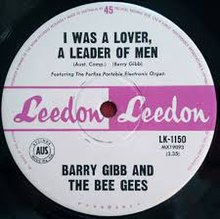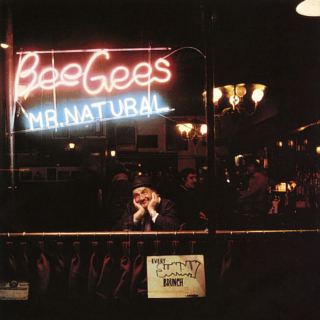
Mr. Natural is the Bee Gees' twelfth album, released in May 1974. It was the first Bee Gees release to be produced by Arif Mardin, who was partially responsible for launching the group's later major success with the follow-up album Main Course. The album's music incorporates more rhythm and blues, soul and funk and hard rock than their previous albums. The cover photograph was taken at 334 West 4th Street, Greenwich Village, New York City by Frank Moscati.

Size Isn't Everything is the twentieth studio album by the Bee Gees, released in the UK on 13 September 1993, and the US on 2 November of the same year. The brothers abandoned the contemporary dance feel of the previous album High Civilization and went for what they would describe as "A return to our sound before Saturday Night Fever".

Spirits Having Flown is the fifteenth album released by the Bee Gees. It was the group's first album after their collaboration on the Saturday Night Fever soundtrack. The album's first three tracks were released as singles and all reached No. 1 in the US, giving the Bee Gees an unbroken run of six US chart-toppers in a one-year period and equaling a feat shared by Bing Crosby, Elvis Presley, and The Beatles. It was the first Bee Gees album to make the UK top 40 in ten years, as well as being their first and only UK No. 1 album. Spirits Having Flown also topped the charts in Australia, Canada, Germany, New Zealand, Sweden and the US.

The Bee Gees Sing and Play 14 Barry Gibb Songs is the debut studio album by the Bee Gees. Credited to Barry Gibb and the Bee Gees, it was released in November 1965 on the Australian Leedon label. It is a compilation of most of the Gibb brothers' singles that had been released over the previous three years in Australia, which accounts for the many different styles of music on it.
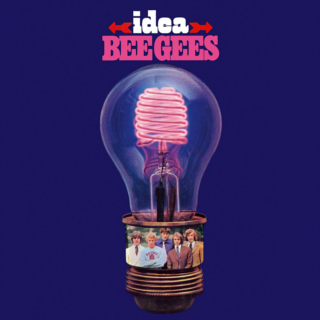
Idea is the fifth album by the Bee Gees. Released in September 1968, the album sold over a million copies worldwide. The album was issued in both mono and stereo pressings in the UK. The artwork on the Polydor release designed by Wolfgang Heilemann featured a "beehive" neon lightbulb with a group photo in its base, while the North American ATCO release designed by Klaus Voormann featured a composite head made from each band member. It was their third internationally released album - the first two albums being released only in the Australian market.
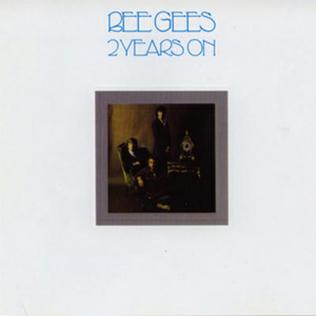
2 Years On is the eighth studio album by the Bee Gees, which reached No. 32 on the US charts. Released in 1970, the album saw the return of Robin Gibb to the group after an earlier disagreement and subsequent split following Odessa. 2 Years On was the first album with drummer Geoff Bridgford, who remained a full-time member of the group until 1972 although he was not pictured on the sleeve. The best-known track is "Lonely Days". Released as the first single by the reunited brothers, it charted high in the US, but peaked at No. 33 in the United Kingdom.

To Whom It May Concern is the tenth album by the Bee Gees. Released in October 1972, it is the follow-up to, and continues the melancholic and personal sound of its predecessor, Trafalgar. The album was recognised as "a farewell to the old Bee Gees" as the album marked the end of an era for the group in several ways: it was their last album to be recorded solely at IBC Studios, in London, their last with conductor and arranger Bill Shepherd, who had guided them since 1967, and their last under their first contract with Robert Stigwood. Some of the songs were old ones finished or rewritten for the occasion.

Life in a Tin Can is the Bee Gees' eleventh studio album, released in January 1973.
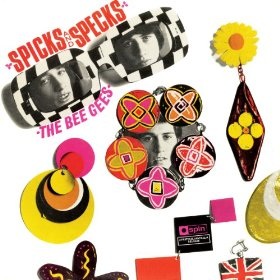
Spicks and Specks is the second studio album by the Bee Gees. It was released in November 1966, on Spin. Primarily written by Barry Gibb, the album features the first Robin Gibb composition "I Don't Know Why I Bother With Myself" and a Maurice Gibb composition "Where Are You".
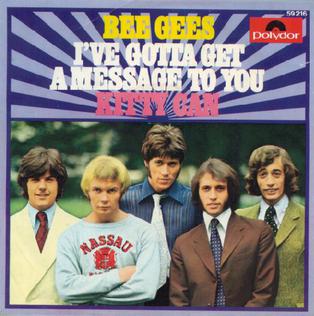
"I've Gotta Get a Message to You" is a song by the Bee Gees. Released as a single on 1968, it was their second number-one single on the UK Singles Chart, and their first US Top 10 hit. Barry Gibb re-recorded the song with Keith Urban for his 2021 album Greenfields.

"Ordinary Lives" is a song released by the Bee Gees in 1989, taken from their 16th studio album One. The song was released as the album's first single on 27 March 1989 by Warner Records. It was written by the group and they produced it with Brian Tench. Following the premature death of their younger brother Andy Gibb in 1988, the Bee Gees dedicated this song and their new album to him. Originally the song was titled "Cruel World" but was later changed to "Ordinary Lives".

Bee Gees' 1st is the third studio album by English group Bee Gees, and their first international full-length recording after two albums distributed only in Australia and New Zealand. Bee Gees' 1st was the group's debut album for the UK Polydor label, and for the US Atco label. Bee Gees 1st was released on 14 July 1967 in the UK. On 9 August it entered the UK charts; on that same day, the album was released in the US, and it entered the US charts on 26 August.

Here at Last... Bee Gees... Live is the first live album by the Bee Gees. It was recorded on December 20, 1976 at the LA Forum and was released in May 1977 by RSO Records. It reached No. 8 in the US, No. 8 in Australia, No. 1 in New Zealand and No. 2 in Spain.

"Peace of Mind" is a song by the Bee Gees, released in Australia as their third in March 1964 and backed with "Don't Say Goodbye".
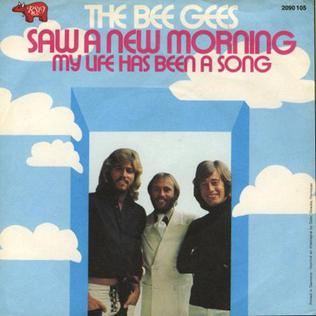
"Saw a New Morning" is the 1973 single released by the Bee Gees. It was also the group's first single released on Robert Stigwood's newly created records label RSO Records. The Bee Gees moved to Los Angeles in 1972 to record the album Life in a Tin Can which was a new direction for the group, who had been recording in England since 1967. The B-side, "My Life Has Been a Song" features lead vocal by Robin Gibb as well as Barry Gibb.
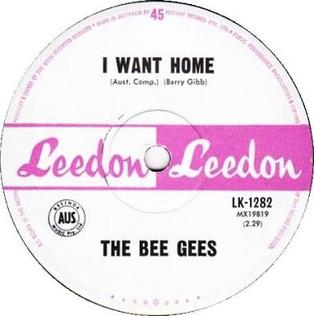
"I Want Home" is a song by the English rock band Bee Gees, written by Barry Gibb and released as a single in Australia in early 1966, backed with "Cherry Red". Their last single on Leedon had not been a hit, so the credit "Barry Gibb and the Bee Gees" used on the last several discs now reverted to simply "Bee Gees". Neither song appeared on any Bee Gees album until the 1967 compilation album, Turn Around, Look At Us, but both were featured on Brilliant From Birth the 1998 anthology of the group's Australian recordings.

"Lamplight" is a song by the Bee Gees, released as the B-side of "First of May", but featured as the single's A-side in Germany. It also featured on their double album Odessa in March 1969. The song was written and composed by Barry, Robin & Maurice Gibb and featured lead vocals by Robin Gibb. No other singles were released from the album, and the fact that the group's manager Robert Stigwood chose "First of May", which only featured Barry Gibb's voice for the A-side, that caused Robin to quit the group.

"You Wouldn't Know" is a song written by Barry Gibb which was recorded by the Bee Gees and released as the B-side of their version of "Everyday I Have to Cry" and later included on the album The Bee Gees Sing and Play 14 Barry Gibb Songs (1965). The album of the same name was released in Europe by Tring Records and features the Bee Gees songs from 1963 to 1966.
"Follow the Wind" is a song by Barry Gibb and the Bee Gees. Written by Barry Gibb, produced by Bill Shepherd, released as the B-side of "Wine and Women" which was charted in Australia. It was later included on The Bee Gees Sing and Play 14 Barry Gibb Songs (1965). It was one of the folk rock songs on the album the others are "I Don't Think It's Funny", "And the Children Laughing" and "I Was a Lover, a Leader of Men".

"Timber!" is a song recorded by the Bee Gees, written by Barry Gibb. The song was released in Australia as their second single in July 1963, backed with "Take Hold of That Star". It was later included on the group's first album The Bee Gees Sing and Play 14 Barry Gibb Songs.
